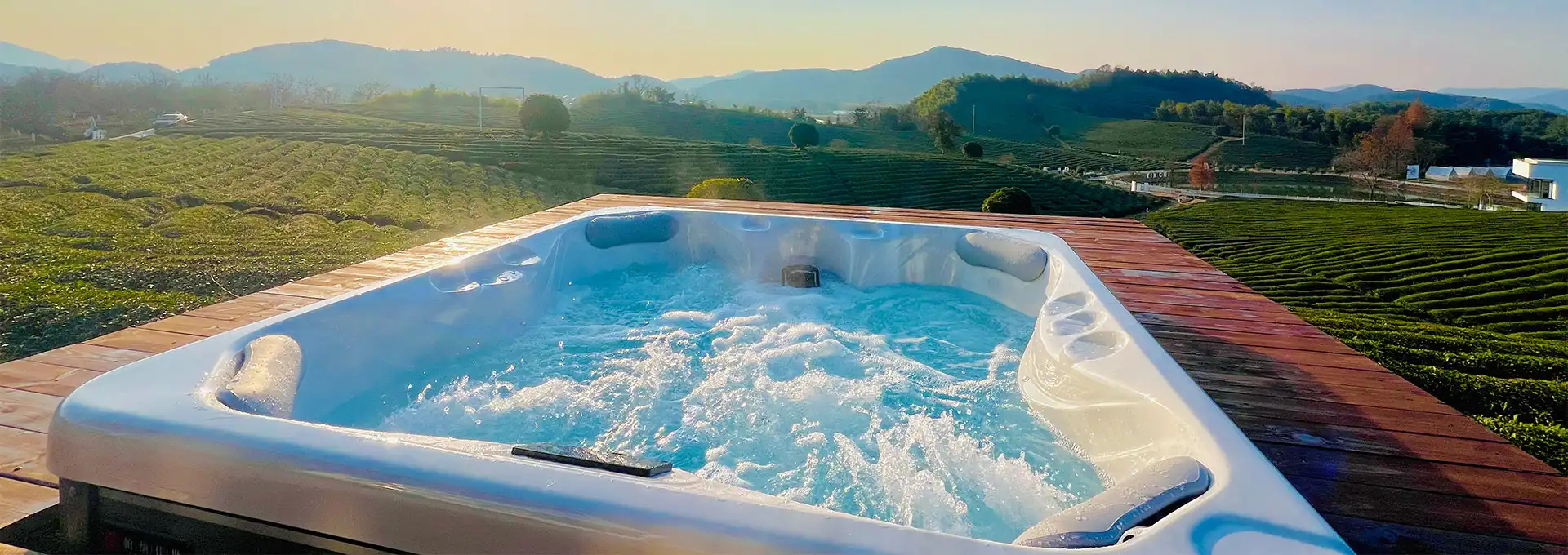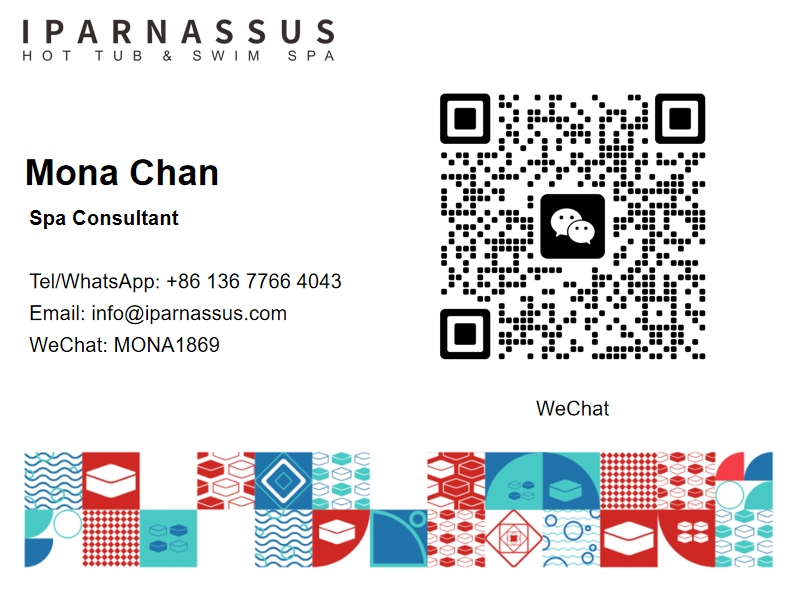Redefining Hotel Hot Tubs with Advanced Water Treatment Solutions
2024-11-05 11:22:21
In the realm of hotel amenities, few features capture the essence of luxury and relaxation quite like a hot tub. These bubbling oases of warmth and comfort have become synonymous with indulgence, offering guests a chance to unwind and soothe their tired muscles after a long day of travel or sightseeing. However, as we delve deeper into the world of hotel hot tubs, we uncover a complex landscape of benefits, challenges, and innovations that go far beyond mere relaxation.
Shenzhen Iparnassus Intelligent Spas Co., LTD is a company specializing in vacation hot tubs and infinity pool spas. Our hot tubs are equipped with circulation filtration and sterilization systems, reducing the need for frequent water changes. The company has professional design, R&D, production, sales, and after-sales service teams, and has obtained more than 30 patents as of 2023. The iParnassus® brand business covers dozens of countries and regions worldwide. It not only brings high-quality Chinese products to global users but also is committed to conveying a lifestyle that integrates spa living with unique Chinese culture. We provide high-end quality products and reliable after-sales service, with products sold to more than 20 countries worldwide. For more information, please contact info@iparnassus.com.
How do hotel hot tubs impact guest satisfaction and loyalty?
The allure of a hot tub can significantly influence a guest's decision when choosing accommodations. Many travelers actively seek out hotels that offer this amenity, viewing it as a hallmark of luxury and a promise of relaxation. The presence of a well-maintained hot tub can elevate the overall guest experience, potentially leading to higher satisfaction rates and increased loyalty.
Research conducted by the American Hotel and Lodging Association (AHLA) suggests that hotels with hot tubs or spa facilities tend to receive higher guest ratings and are more likely to generate repeat bookings. This correlation underscores the importance of not just having a hot tub, but ensuring it meets or exceeds guest expectations in terms of cleanliness, functionality, and overall appeal.
However, the impact on guest satisfaction isn't solely dependent on the hot tub's existence. The quality of the experience plays a crucial role. Factors such as water temperature, jet pressure, cleanliness, and the surrounding ambiance all contribute to the overall perception. Hotels that invest in high-quality hot tubs and maintain them meticulously often see a positive return on investment through increased guest satisfaction and word-of-mouth recommendations.
Moreover, the social aspect of hot tubs shouldn't be overlooked. In many hotels, these facilities serve as gathering points for guests, fostering a sense of community and enhancing the overall social experience of the stay. This can be particularly appealing for business travelers or those attending conferences, providing a relaxed setting for networking and unwinding after a day of meetings.
What are the potential health risks associated with hotel hot tubs?
While the benefits of hot tubs are widely celebrated, it's crucial to address the potential health risks they may pose. The warm, moist environment of a hot tub can be an ideal breeding ground for bacteria and other microorganisms if not properly maintained. This raises concerns about the transmission of various infections and skin conditions.
One of the most notorious health risks associated with poorly maintained hot tubs is "hot tub folliculitis," a skin infection caused by the bacterium Pseudomonas aeruginosa. This condition results in a red, itchy rash that typically appears within 48 hours of exposure to contaminated water. While usually not serious, it can cause discomfort and negatively impact a guest's experience.
More severe health risks can arise from the presence of Legionella bacteria, which can cause Legionnaires' disease, a severe form of pneumonia. The Centers for Disease Control and Prevention (CDC) has reported several outbreaks of Legionnaires' disease linked to hotel hot tubs over the years. These incidents underscore the critical importance of rigorous maintenance and water treatment protocols.
Additionally, the high temperatures of hot tubs can pose risks to certain individuals, such as pregnant women, people with heart conditions, or those with compromised immune systems. Hotels must provide clear warnings and guidelines for safe use to protect their guests and mitigate potential liability issues.
To address these concerns, many hotels are implementing advanced water treatment systems and strict maintenance schedules. UV sterilization, ozone treatment, and automated chemical balancing systems are becoming increasingly common in high-end establishments. These technologies help ensure that the water remains safe and hygienic, even with frequent use by multiple guests.
How are innovations in water treatment systems revolutionizing hotel hot tubs?
The hospitality industry is witnessing a technological revolution in hot tub maintenance and water quality management. This shift is particularly significant in regions like the Middle East, where water scarcity and quality issues are prevalent. Innovative water treatment and filtration systems are addressing these challenges head-on, offering solutions that not only enhance safety but also improve sustainability.
One of the most significant advancements is the development of intelligent circulation and filtration systems. These systems continuously monitor water quality, adjusting chemical levels and filtration rates in real-time. This automation ensures that the water remains clean and balanced, reducing the need for frequent draining and refilling – a crucial feature in water-scarce regions.
Ultraviolet (UV) sterilization is another technology gaining traction in the hotel industry. UV light effectively neutralizes a wide range of microorganisms, including bacteria, viruses, and algae. When combined with traditional chlorine or bromine treatments, UV systems can significantly reduce the amount of chemicals needed, resulting in water that's gentler on the skin and eyes while still maintaining hygiene standards.
Ozone treatment is also making waves in hot tub technology. Ozone is a powerful oxidizer that can destroy contaminants and microorganisms without leaving behind harmful byproducts. Hotels implementing ozone systems report improved water clarity and a reduction in the characteristic "chlorine smell" often associated with hot tubs.
Advanced filtration media, such as activated carbon and zeolite, are being utilized to remove finer particles and dissolved contaminants from the water. These materials can trap impurities that traditional sand filters might miss, resulting in cleaner, clearer water that's more inviting to guests.
Some cutting-edge hotels are even exploring the use of saltwater systems for their hot tubs. These systems use electrolysis to generate chlorine from salt, providing a more natural and skin-friendly alternative to traditional chemical treatments. While the initial investment may be higher, many hotels find that the improved guest experience and reduced ongoing maintenance costs make it a worthwhile investment.
The integration of smart technology is also transforming hot tub management. IoT-enabled sensors can monitor water quality, temperature, and chemical levels in real time, alerting maintenance staff to any issues before they become noticeable to guests. Some systems even allow for remote monitoring and adjustment, ensuring that the hot tub is always in optimal condition, even during off-hours.
These innovations are not just improving the guest experience; they're also addressing environmental concerns. By reducing water waste and chemical usage, hotels can minimize their ecological footprint while still providing a luxury amenity. This aligns with the growing demand for sustainable travel options and can be a significant selling point for environmentally conscious guests.
As we look to the future, the evolution of hotel hot tubs is likely to continue at a rapid pace. From self-cleaning surfaces that resist bacterial growth to AI-driven maintenance systems that predict and prevent issues before they occur, the possibilities are endless. Hotels that embrace these innovations will be well-positioned to offer a superior guest experience while addressing the challenges of water conservation and hygiene.
In conclusion, hotel hot tubs represent a fascinating intersection of luxury, health, technology, and sustainability. While they continue to be a sought-after amenity, the industry is evolving to address the challenges associated with their operation. Through innovative water treatment systems, rigorous maintenance protocols, and a commitment to guest safety and satisfaction, hotels are working to ensure that their hot tubs remain a source of relaxation and enjoyment for years to come.
As guests, we can appreciate the complexity behind these seemingly simple pools of warm water. The next time you sink into a hotel hot tub, take a moment to consider the advanced systems working behind the scenes to provide you with a safe, clean, and enjoyable experience. And remember, while hot tubs offer numerous benefits, it's always wise to use them responsibly and in accordance with the hotel's guidelines.
For more information on hot tub installations and our products, please feel free to contact us at info@iparnassus.com.
References:
1. American Hotel and Lodging Association. (2023). "Amenities and Guest Satisfaction Report."
2. Centers for Disease Control and Prevention. (2024). "Legionnaires' Disease and Hot Tubs."
3. Journal of the American Academy of Dermatology. (2022). "Hot Tub Folliculitis: Prevalence and Prevention."
4. International Journal of Hospitality Management. (2023). "Innovations in Hotel Amenities: The Role of Advanced Hot Tub Technologies."
5. Water Science and Technology. (2024). "Comparative Study of Hot Tub Water Treatment Systems in Arid Regions."
Send Inquiry
Related Industry Knowledge
- The Impact of Hot Tubs on Hotel Revenue in the Middle East
- Why do people use hot tubs
- Does Hot Tub Help Sunburn?
- How Often to Drain a Hot Tub?
- Should Leave Outdoor Hot Tub on During Winter?
- Can You Put Bath Bombs in a Hot Tub?
- How Do I Choose the Right Outdoor Swimming Spa Cover or Barrier to Comply With Safety Regulations?
- Is hot tub good before a game?
- How to Operate Spa Valves on Swimming Pool Piping?
- How to Boost Alkalinity in Hot Tub?



